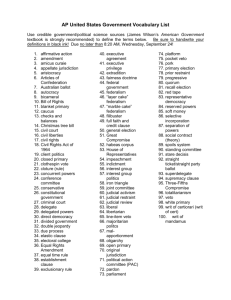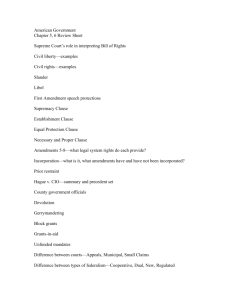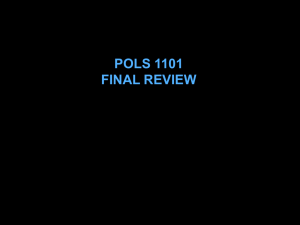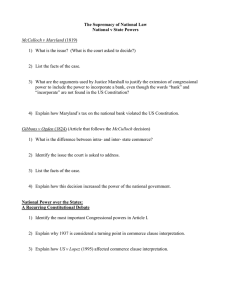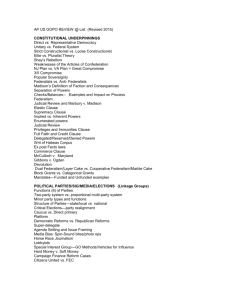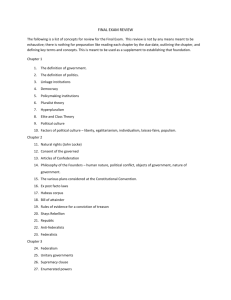& CONSTITUTIONAL LAW: CASES, MATERIALS, PROBLEMS
advertisement
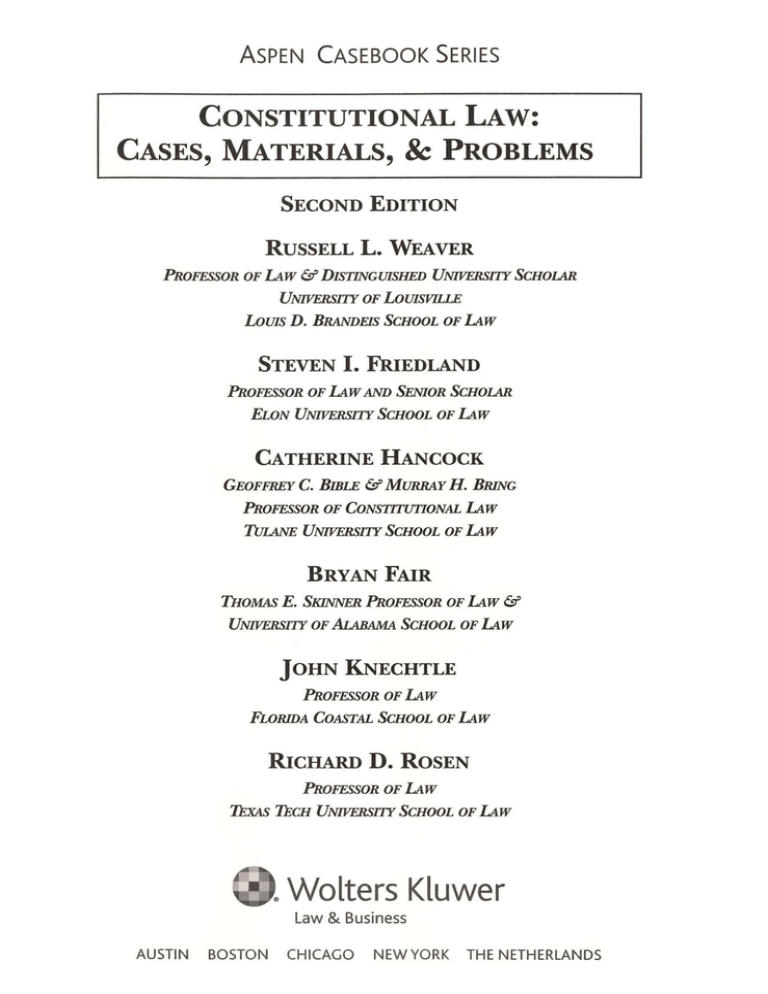
ASPEN CASEBOOK SERIES CONSTITUTIONAL LAW: CASES, MATERIALS, & PROBLEMS SECOND EDITION RUSSELL L. WEAVER PROFESSOR OF LAw & DISTINGmSHED UNWERSITY SCHOLAR UNWERSITY OF LomsVILLE Loms D. BRANDEIS SCHOOL OF LAw STEVEN I. FRIEDLAND PROFESSOR OF LAw AND SENIOR SCHOLAR ELON UNWERSITY SCHOOL OF LAw CATHERINE HANCOCK GEOFFREY C. BIBLE & MURRAY H. BRING PROFESSOR OF CONSTITUTIONAL LAw ThLANE UNWERSITY SCHOOL OF LAw BRYAN FAIR THOMAS E. SKINNER PROFESSOR OF LAw & UNWERSITY OF AlABAMA SCHOOL OF LAw JOHN KNECHTLE PROFESSOR OF LAw FLORIDA COASTAL SCHOOL OF LAw RICHARD D. ROSEN PROFESSOR OF LAw IEXAS IECH UNWERSITY SCHOOL OF LAw ~ Wolters Kluwer Law & Business AUSTIN BOSTO N CHICAGO NEW YORK TH E NETHE RLA NDS TABLE OF CONTENTS xvu xzx Preface The Constitution of the United States I. JUDICIAL REVIEW A. B. C. Marbury and "The Power to Say What the Law Is" Restraints on Judicial Authority 1. Practical Limitations on Judicial Authority 2. Congressional Control over Federal Court Jurisdiction 3. The Political Question Doctrine The Case or Controversy Requirement 1. The Prohibition Against Advisory Opinions 2. Ripeness 3. Mootness 4. Standing 1 2 14 15 16 22 28 28 30 36 40 II. NATIONAL LEGISLATIVE POWER A. B. C. D. E. The Necessary and Proper Clause The Commerce Clause 1. Early Cases 2. Early Twentieth-Century Cases 3. The Constitutional Crisis 4. Post-Switch Expansion of Federal Power: A Half Century of Deference 5. Revolution and Retreat? The Taxing Power Power to Spend for the General Welfare The War Power and Treaty Power 1. The War Power 2. The Treaty Power 105 108 123 123 130 140 150 162 185 190 199 200 203 Xl xii F. Contents Congressional Power to Enforce Civil Rights 1. Early Developments 2. Modern Civil Rights Cases 3. Congressional Enforcement of the Right to Vote 4. Religious Freedom and Congressional Fourteenth Amendment Enforcement Power 209 213 215 218 222 III. THE FEDERAL E XECUTIVE PoWERS A. B. C. D. E. F. G. H. I. J. Implied Presidential Powers The Volatile Boundary Between Executive and Legislative Powers Additional Separation of Powers Issues Between the Executive and the Legislature: Nondelegation, Veto, and Appointment and Removal 1. The "Nondelegation" of Powers Doctrine 2. The Veto Power The President' s Appointment and Removal Powers 1. The President's Recess Appointment Power Foreign Affairs, War, and Treaty Powers 1. Foreign Affairs Powers 2. War and the Commander-in-Chief Power- An Illustration of Formalism Versus Functionalism The President's Power to Fight Terrorism 1. The President's Powers to Detain Alleged Terrorists 2. Detention of U.S. Citizens as Alleged Terrorists 3. The War on Terror's Impact on Privacy The Treaty Power Executive Agreements Executive Privilege and Immunity from Suit 1. Executive Privilege 2. Immunity from Suit The Pardon Power 1. Commutation of Sentences 233 236 238 249 250 253 266 277 283 283 286 288 288 290 313 314 317 322 322 327 331 331 THE RELATIONSHIP BETWEEN THE STATES AND THE FEDERAL GoVERNMENT A. B. C. D. State Power to Tax the Federal Government Federal Power to Tax the States State Immunity from Federal Regulation Federal Commandeering of State Resources 333 334 337 343 358 Contents xiii v. STATE POWER TO REGULATE COMMERCE A. B. C. D. E. F. Early Cases Discrimination Against Interstate Commerce 1. Facial Discrimination 2. Facially Neutral Statutes with Discriminatory Purposes or Effects Nondiscriminatory Burdens on Interstate Commerce 1. The Scope of Judicial Review 2. Modern Applications of the S. Pacific Test The State as a Market Participant Interstate Privileges and Immunities Clause Preemption 379 382 388 388 403 411 411 420 431 439 448 VI. STATE ACTION A. B. C. Requiring State Action Government Function 1. Company Towns 2. Party Primaries 3. Utility Service 4. Schools and School Associations State Involvement or Encouragement 1. Government Regulation 2. Judicial Involvement 3. Government Funding 4. Quasi-Government Corporations 465 466 470 470 474 477 480 490 491 500 516 520 VII. PROCEDURAL DUE PROCESS A. B. Legislative Determinations Adjudicative Determinations 1. Foundational Principles 2. Procedural Requirements 527 528 531 532 541 xiv Contents VIII. SUBSTANTIVE PROTECTION OF ECONOMIC RIGHTS A. B. C. Substantive Due Process: From Allgeyer to Lochner to Nebbia The Takings Clause The Contract Clause 563 566 579 630 IX. SUBSTANTIVE DUE PROCESS: MODERN fuNDAMENTAL RIGHTS A. B. 643 645 654 654 668 705 710 715 720 732 Incorporation The Right of Privacy 1. Seminal Developments 2. Abortion 3. Family Liberty 4. The Right to Marry 5. Parental Rights 6. Sexual Orientation 7. Right to Die X. EQUAL PROTECTION A. B. c. D. E. State Economic Regulations Racial Classifications 1. Separate but Equal 2. Desegregation 3. Diversity Gender 1. Early Gender Jurisprudence 2. Doctrinal Turmoil and Evolution 3. Recognition of Differences 4. Discrimination Against Men 5. Gender Classification in Context The Rights of Aliens 1. The Right to Receive Social Welfare Benefits, to Practice Law, and to Seek Employment in the Civil Service 2. Restrictions Based on the "Political Function" Doctrine 3. Federal Regulation of Aliens The Rights of Unmarried Parents and Their Children 1. Inheritance Rights 2. Rights to Sue and to Receive Government Benefits 757 760 766 771 778 818 833 833 836 841 852 861 870 871 874 879 881 882 884 Contents 3. F. G. H. Rights of Unmarried Parents to Retain Custody of Their Children 4. Immigration Preferences The Rights of Persons with Mental Disabilities Sexual Orientation/Sexual Preference The Fundamental Rights Strand of Equal Protection 1. Freedom of Speech 2. Access to the Justice System: The Right to Counsel 3. The Right to Travel 4. Voting 5. Education xv 893 893 894 901 905 906 906 911 921 960 XI. FREEDOM OF SPEECH A B. C. D. E. F. G. H. Historical Intentions and Underlying Values 1. Framers' Intent 2. Underlying Values Categories of Speech 1. Advocacy of Illegal Action 2. Fighting Words and Hostile Audiences 3. Offensive Speech 4. Defamatory Statements 5. Privacy 6. Emotional Distress 7. Obscenity 8. Child Pornography 9. Pornography That Degrades Women 10. Near Obscene 11 . "Hate" Speech 12. Crush Videos 13. Commercial Speech Symbolic Speech Overbreadth and Vagueness Prior Restraints 1. Licensing 2. Injunctions The Press 1. Does the Constitution Grant the Press a Privileged Position? 2. Does the Press Have Special Immunities? 3. Access to Judicial Proceedings 4. Access to Prisons 5. The Press and Due Process 6. Due Process and Prior Restraints Access to Government Property First Amendment Rights of Public Employees 1. Prohibiting Electioneering 983 984 984 985 992 992 1022 1036 1043 1069 1075 1079 1100 1119 1126 1142 1166 1172 1185 1217 1236 1236 1243 1264 1264 1265 1271 1275 1278 1285 1290 1322 1322 xvi I. J. K. L. M. Contents 2. Other Employee Speech 3. Associated Rights Government Support of Speech Broadcast Regulation Advancing Technology Freedom of Association 1. The Right to Associate 2. The Right "Not to Speak" Campaign Finance Laws 1326 1346 1353 1368 1381 1404 1404 1424 1441 XII. THE RELIGION CLAUSES A. B. C. The Establishment Clause 1. Financial Aid to Religion 2. School Prayer 3. Curricular Issues 4 . Official Acknowledgment The Free Exercise Clause 1. Burdens on Religion 2. Discrimination Against Religion Establishment: Free Exercise and Free Speech Tension 1495 1496 1496 1527 1540 1549 1583 1583 1607 1617 XIII. THE RIGHT TO KEEP AND A. B. C. D. E. F. G. BEAR ARMs Introduction Early Cases The Meaning of the Second Amendment Between 1939 and 2008 The Heller Revolution What Is the Scope of the Right? What Is the Standard of Review? 1. Heller's Limited Guidance 2. Application of the Right to Arms in the Lower Courts 3. Heller's Effect on Gun Regulations 4 . The Second Amendment's Reach Does the Right Apply to the States? Table of Cases Index 1639 1640 1641 1642 1649 1664 1664 1664 1665 1668 1668 1670 1687 1705

